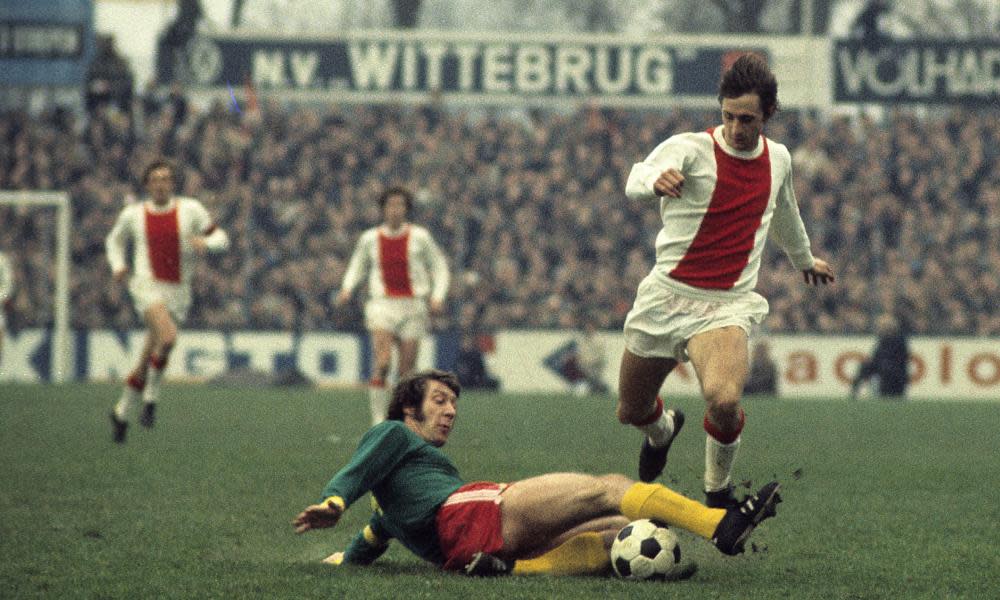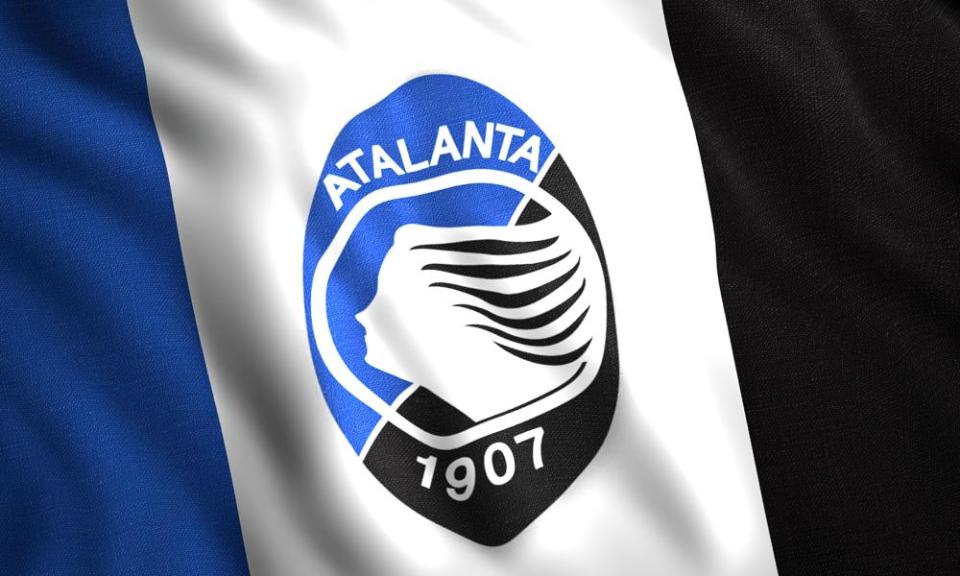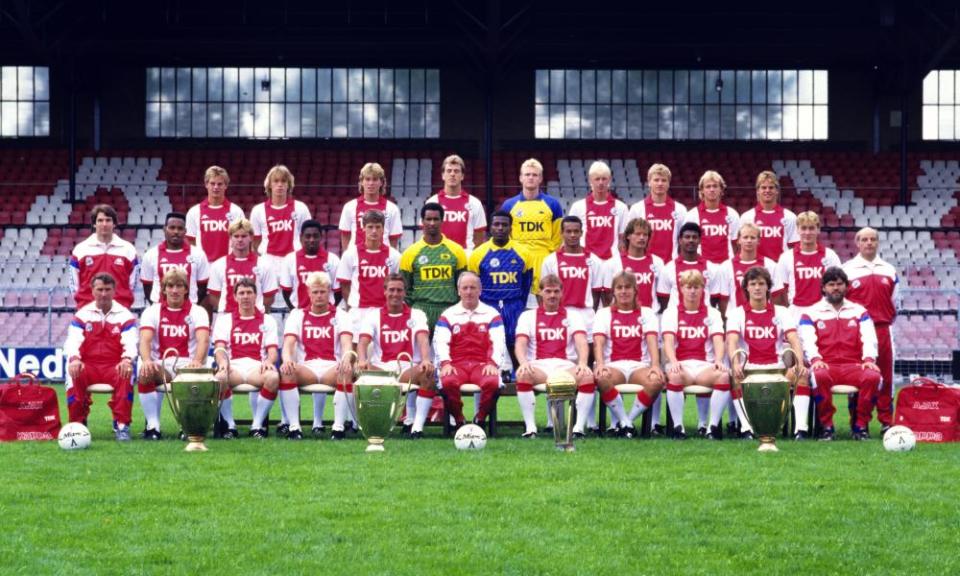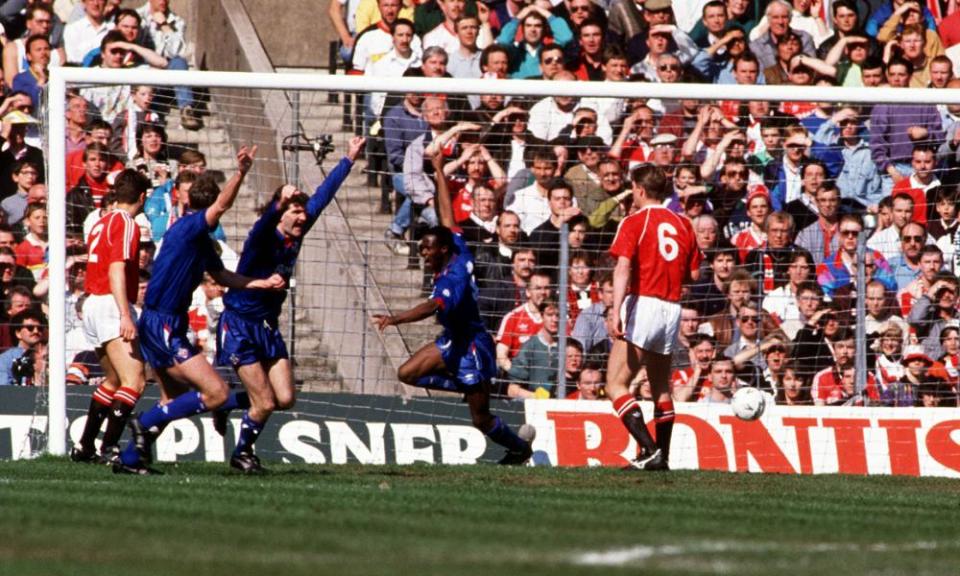Which football clubs are named after mythological gods and heroes?

“In Iceland there are a couple of football clubs named after the Norse god Thor, and another after his son Magni,” writes Kári Tulinius. “Hertha Berlin were named after a ship, but that ship was named for an old Germanic goddess. Are there other clubs named after mythological gods or goddesses?”
We touched on this back in 2011, in a question about teams named after fictional characters:
The Dutch side Heracles Almelo, Greek club Iraklis of Salonica and recently-relegated Spanish minnows Hércules Alicante are all named after the demi-god son of the father of gods and men, Zeus.
There are plenty more where Zeus came from. We decided to include mythological heroes as well as gods and goddesses – mainly to accommodate some decent answers in our mailbox, partly as an excuse to use a picture of Johan Cruyff.
Ajax “Ajax of Amsterdam are named after the Greek hero Ajax the Great,” writes Michael Haughey.
Apollon Limassol
Apollon Limassol in Cyprus too. Was Apollo famed for his blue-and-white shirts or something? pic.twitter.com/kFuxB2NRYd
— Steve Hyde (@StevenJamesHyde) August 9, 2022
Apollon Smyrnis/Aris Thessaloniki
Aris Thessaloniki and Apollon Smyrnis in Greece even go so far as to feature the relevant deities on their club crests pic.twitter.com/1o93yaH95g
— Steve Hyde (@StevenJamesHyde) August 9, 2022
Atalanta Arik Roy and Tom Aldous both cited Atalanta, the great overachievers of Serie A in recent years. “They are named after the Greek heroine Atalanta who, though not a god, was aligned with the Greek god Artemis,” writes Tom. “Their club badge is a depiction of Atalanta.”

Randers Freja “Randers Freja from Randers in Denmark is named after Freja, the Norse goddess of love and fertility that the English-speaking world knows as Freyja,” says William Jansen.
Veles Moscow “In the Russian second tier there’s Veles Moscow, named after a Slavic pagan god Veles,” says Marat Airapetian.
Inevitably, there are loads and loads more of these. Here’s a helpful Wikilist; as you can imagine, there are plenty in Greece, Cyprus and the Netherlands.
More record runners-up streaks
A few weeks ago we looked at the teams that had been runners-up in multiple consecutive seasons, mainly in Europe’s top five leagues. But it’s a big, wide world out there, and our mailbag has been inundated with more answers.
“Between 1985-86 and 1988-89, Ajax finished second four times in a row,” writes Dirk Maas. “PSV were their nemesis in all those seasons. Shakhtar Donetsk lost four consecutive cup finals between 2016 and 2019. So did AEK Athens between 2017 and 2020. Celtic didn’t win any of their League Cup finals between 1971 and 1974. Also worth mentioning is the fact that América de Cali lost three Copa Libertadores finals in a row between 1985 and 1987.

“Another remarkable ‘feat’ is the outcome of the Romanian top flight at the end of the 1980s. In the 1986-87, 1987-88 and 1988-89 seasons Steaua always became champions, Dinamo Bucharest always finished as runners-up and Victoria Bucharest always ended in third. After the fall of the Ceaușescu regime in December 1989, the Romanian first division became less predictable.”
Next, a hard-luck story from Thailand. “After winning the Thai Premier League in 2007,” begins Dale Farrington, “my club, Chonburi, went on the following run of finishes: 2nd, 2nd, 3rd, 2nd, 2nd, 3rd, 2nd. We were also FA Cup runners-up in 2014. That will take some beating.”
It will, but Opeyemi Ajala has managed it. “In Nigeria, Mighty Jets lost six consecutive Nigerian FA Cup finals between 1962 and 1967, and three more between 1970 and 1974,” writes Opeyemi. “Egypt’s Zamalek Sporting Club finished as runners-up on seven successive occasions between 1950-51 and 1958-59.”
Finally, Vincent Lacey has provided a very handy list of other notable bridesmaids. (Thanks also to Admir Pajiæ for his comprehensive work on this, which covered similar ground.)
Tunisia: Étoile Sportive du Sahel seven second-place finishes in a row (1999-2000 to 2005-06). Club Africa were third in each of the last six seasons of this spell.
Bolivia: The Strongest 7 (2017 Apertura – 2020 Apertura; seven tournaments over four years)
Honourable mentions to the below, who all came second for five consecutive seasons.
Canada: Hamilton Steelers (1983, 1987-90; no league between 1984 and 1986)
Kazakhstan: Kairat (2015-19)
Moldova: Tiligul-Tiras Tiraspol (1992 to 1995-96; one spring season in 1992, then autmn-spring from 1992-93 onwards)
Scotland: Rangers (1965-66 to 1969-70)
Taiwan: Taipower (2017-21)
Turkmenistan: Ahal FC (2017-21)
Ukraine: Shakhtar Donetsk (1996-97 to 2000-01)
Uzbekistan: Neftchi Farg’ona (1996-2000)
“For cup final losses, RSSSF has a handy list,” concludes Vincent, “including the nugget that FC Zhashtyk-Ak-Altyn Kara-Suu lost six consecutive Kyrgyzstan Cup finals in a row between 2001 and 2006.” They lost again in the 2008 final, this time on penalties, and still haven’t won the competition. Who’d be an FC Zhashtyk-Ak-Altyn Kara-Suu fan?
Longstanding record signings (2)
In last week’s Knowledge, we looked at clubs whose record signing is at least 30 years old. (The signing, not the player.) As ever, there were a couple we missed.
“My club Leyton Orient can only dream of having a record signing as recent as the 1990s,” notes Rich Browne. “We’re still living off the memories of the £175,000 we paid Wigan for Paul Beesley in 1989. Impressive in a way that, despite not spending anything on transfer fees, we still mismanaged our finances to the extent of having a winding-up petition served on the club in 2017.”
And finally to a team who, in our nostalgic hearts, will always be bloodying the noses of the elite. “We’ve only just slipped into the fifth tier, so hopefully you will not add further insult to injury by ignoring the claims of Oldham Athletic?” writes Adam Connor. “Both our record signing, Ian Olney (£0.75m from Aston Villa, June 1992), and record sale, Earl ‘The Pearl’ Barrett (£1.7m to Aston Villa, Feb 1992), occurred more than 30 years ago, in that apparent year of the splurge.”

Knowledge archive
“Which player has played the most games under the management of his dad?” asked Steven Wild in 2011. “I would guess Nigel Clough is a frontrunner with 311 league games, far outplaying the likes of Darren Ferguson with 27 under Sir Alex.”
Step forward Lee Johnson. “He played 192 League matches for Yeovil (all under his dad) and 155 times for Bristol City (136 times under his dad),” writes Robin Tucker. “So that makes a grand total of 328 League games under his dad. He also played in 17 cup ties for each side.”
Nods should also go to Blair Sturrock, who was signed by his father Paul at Dundee United, Swindon, Plymouth and Southend, (playing 136 league matches under Sturrock Sr in the process) while Gio Pirtskhelani reckoned Paolo Maldini played 53 games under his father Cesare (12 times for the Italy U21s, 29 games for the full national side and 12 games for Milan).
Can you help?
“Northern Ireland champions Linfield, like Chelsea’s 2012-13 vintage, are set to compete in eight different competitions this season: Irish League, Irish Cup, Irish League Cup, NIFL Charity Shield, Scottish Challenge Cup, Uefa Champions League, Europa League and the Europa Conference League. Has any top-flight team ever participated in more competitions in one season?” asks Daniel Stevens.
Lucas Digne now has the dubious honour of scoring an own goal for both sides in The Most Played Fixture in English Football™ (Aston Villa v Everton). Have many other players managed to match this record of OGing for both sides in the same fixture? @TheKnowledge_GU
— Jarek Zaba (@JarekZaba) August 15, 2022
“To hear that a fixture is a ‘six-pointer’ is pretty common in the modern game, but I can’t ever remember hearing a game was a ‘four-pointer’ when it was just two points for a win. Can anyone find examples of pre-1981 games called four-pointers?” wonders Ed Butler.
@TheKnowledge_GU Newhaven beat Canterbury 10-0 on Wednesday in their FA Cup Extra Preliminary Round replay, after they drew 1-1 on Saturday.
Is this the most one-sided replay ever? https://t.co/w2GBoCLpAZ— Mark Morton (@PontoonDock) August 11, 2022
“With yet another Danish signing, Brentford continue their evolution into the next Danish national team. It got me thinking, has a national team ever fielded an XI entirely from a single club before?” asks Robin Hine.
Do any fanbases regularly sing in praise of a player who never actually played for them? Possibly due to scoring a vital goal against a rival or something similar?
— Andy Brook 🏆 (@andybrook1) August 16, 2022
Mail us your questions or tweet @TheKnowledge_GU.

 Yahoo Movies
Yahoo Movies 
